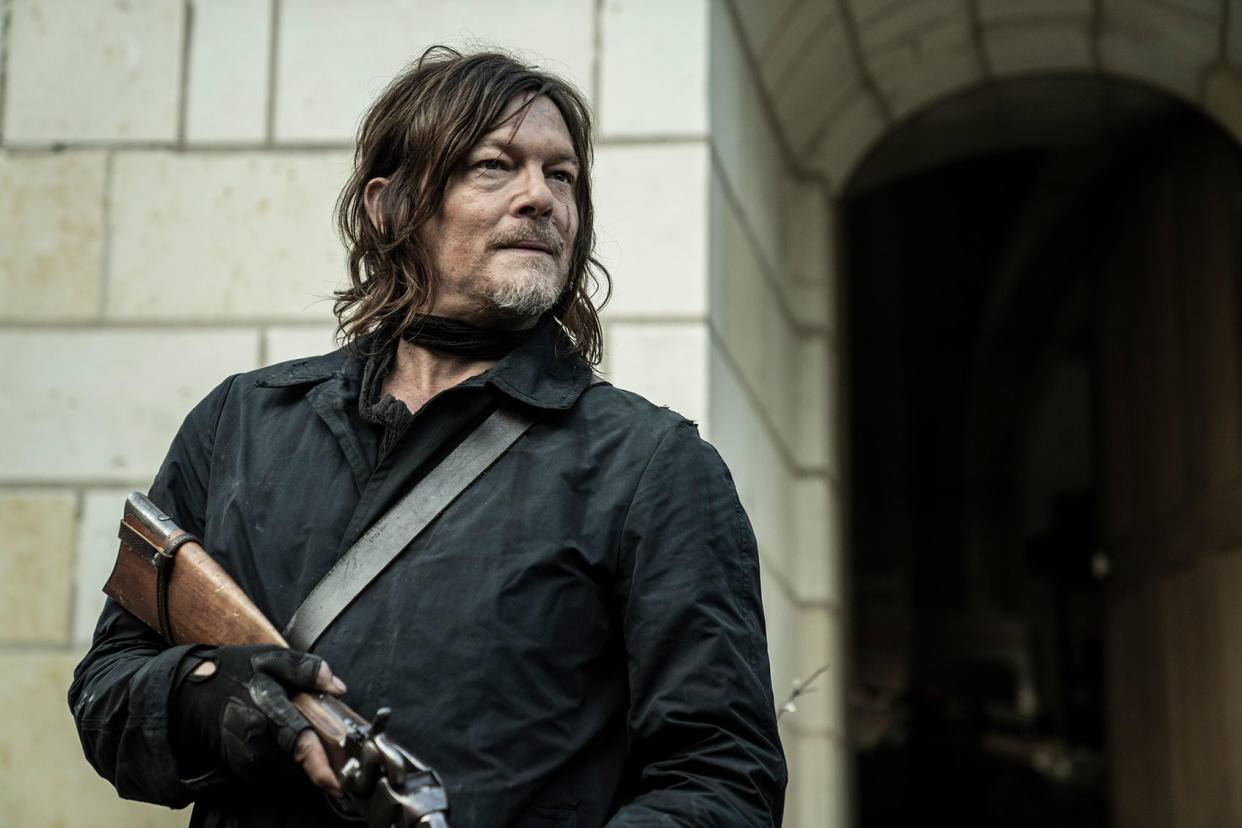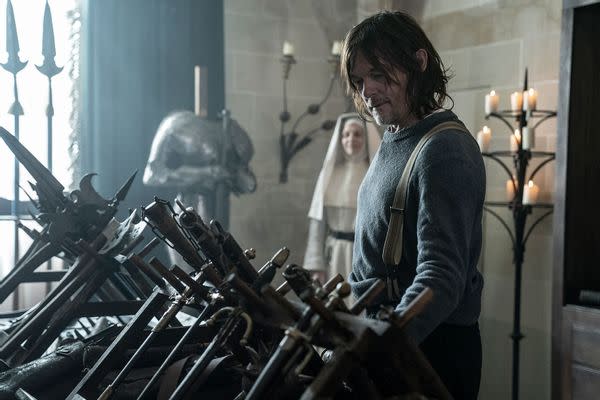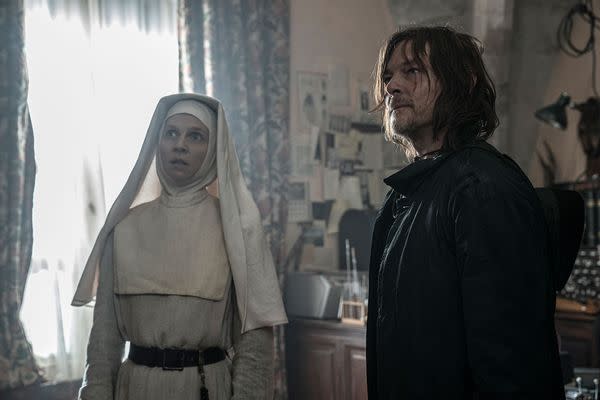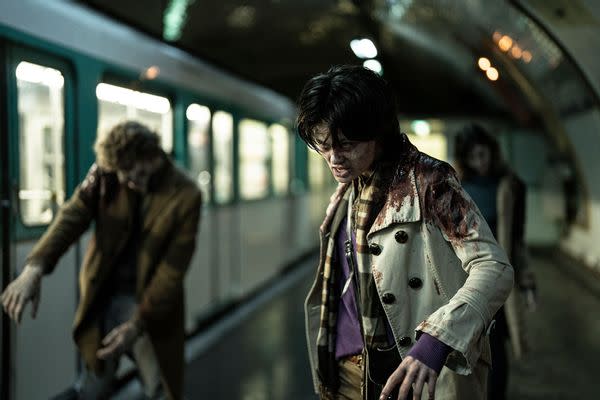"The Walking Dead" plops Daryl Dixon in a zombie-infested France. But he's no ugly American

Sometimes combining one unique flavor with another creates something new and tasty.
Apologies to both fans of "The Walking Dead" and 2007's "Ratatouille," the film from which I drew that reference. But I could help repeating it to myself while watching "The Walking Dead: Daryl Dixon," which plucks Norman Reedus' road warrior out of his natural, gritty New World environs and makes him play an American in undead Paris.
Sounds preposterous, doesn't it? Presumably the end of the world would shut down the leisure travel market; plus, Daryl experiences plenty of culture clashes via interstate travel in the U.S. This leaves us with the inevitable questions of why this side mission happens, and how.
Explaining these is the least interesting subplot of the six-episode adventure, which launches with Daryl washing up on a beach in the south of France before encountering people who mean him harm. In this the French and Americans are not so unalike, proving desperation and violence transcend borders and culture. But this landscape, gorgeous though it may be, is as foreign as the language he doesn't understand.
Reedus' Daryl is one of the most popular heroes of "The Walking Dead," if not the top favorite, which would make scratching his American coarseness against whatever Europe is serving at the end of the world too easy.
Besides, he takes to the place's medieval flavor straightaway. Since guns aren't as pervasive in French society, most of the firearms Daryl faces down are ancient hunting rifles or the odd service pistol. But Daryl was always an old-school scrapper, giving him an edge. In America, he's a ruffian who hunts with a bow and arrow. In Europe, he's free to get medieval on his opponents, carrying himself like a knight.

Appropriate to that shift showrunner David Zabel and the writers make Daryl's godlessness his test, stacking it against the spirituality driving the survivors he falls in with. The first among them are nuns.
Related
TV tells us who's lucky to survive
This oppositional energy sustains a story you've already seen some version of before – in fact, you probably watched it with enthusiasm when 2023 was new. Between the magical child delivery and the hero's emotional transformation, there are enough parallels between this spinoff and that HBO sensation to think of "Daryl Dixon" as "The Last of Us" with a Gallic accent.
"America is an infant," a French survivor says, "but here, we survived many apocalypses."
That many people know Daryl's history, having witnessed formative moments in early episodes of the original series, buys the show some forbearance.
The angry, distrusting biker introduced more than a dozen years ago now has a softer heart, a paternal side and many more scars. Daryl doesn't often lose fights, but he doesn't often walk away without a few bruises or the occasional concussion. Part of his charisma is in his quiet determination, which often translates as pessimistic stubbornness tinged with misanthropy.
Crossing paths with Sister Isabelle (Clémence Poésy) challenges that. She brings him to her convent, nurses him back to health, and presses him into service with an errand to ferry a special boy named Laurent (Louis Puech Scigliuzzi) to the heart of their revolutionary network. This interfaith underground resistance believes Laurent is the new messiah and intends to raise him to become a leader.
Not everyone is as enthusiastically on board with this supposedly holy mandate, Daryl least of all. Still, he accepts the quest on the condition that once he drops off the kid, this Union d'Espoir (which translates to Union of Hope) will find him a ship back to the States.

Odysseys like this never travel a straight line, and "Daryl Dixon" does not avoid its share of predictable, ridiculous detours. In the imaginations of those who wove "Daryl Dixon" together, for instance, Parisians would prioritize recreating an underground Moulin Rouge over clearing the zombies from their streets or, for goodness sake, establishing a fortified bistro. I suppose there's only so much originality to be mined from a universe bent on peeling every last bit of gristle off its main story.
But then, a few side trips are intentional nods at the zombie genre as it currently stands and what we know about French popular culture. Some of those homages are completely on the nose, albeit pleasantly so; for example, Daryl, Isabel, Laurent and fellow traveling sister Sylvie (Laika Blanc Francard) encounter a city of lost children in an episode before meeting a character played by "City of Lost Children" star Dominique Pinon.
We need your help to stay independent
Subscribe today to support Salon's progressive journalism
This is a subtler gesture than a few of the show's droller tourist traps, some of them macabre, and some stereotypical to the brink of begging you to scan the background for mimes in berets.
In most respects, though, French survivors resemble their American counterparts, down to the individuals. One of Daryl's main adversaries is named Codron (played by Romain Levi), but I challenge you to refrain from referring to the guy as French Merle. Daryl isn't the only American expat in France either, and certainly not among the "ugly" ones.
Even a Paris in tatters could never be called a ruin.
But their zombies can be more hazardous for reasons beyond the usual. For someone who doesn't speak French and can't understand the warning signs people have painted to provide a heads-up, that's a real problem.
Reedus transmits a quiet endurance in his performance matched by Poesy's calm determination and Scigliuzzi's serene stoicism. Laurent is constantly referred to as a child wiser than his years, but the actor keeps us wondering whether that's a product of wisdom drilled into him by the nuns' education or some divine influence, which means he understood the assignment.

Zabel and the writers' greater accomplishment is the way they've accounted for our fatigue with the original show's kill-or-be-killed survival philosophy, which rusted into a grind by its close. Instead "Daryl Dixon" proposes that living well requires living for something greater than yourself or the few others you've chosen to let in.
Want a daily wrap-up of all the news and commentary Salon has to offer? Subscribe to our morning newsletter, Crash Course.
This elevates the usual morality parables the zombie genre trades in by inviting us to consider whether the individualism Americans take pride in is better in the long run than the philosophy of serving a common cause that is central to many European societies. This is implied, not spoken, although it's not exactly difficult to notice that the key villain, Genet (Anne Charrier), is an autocratic capitalist intent on bringing France under her power, while the heroes are devout, spread across the country and live in self-supporting communes.
Like everything that is best about this series, we watch these ideals proved out in action, framed by ancient buildings and structures and played by a cast whose performances pull us through that resolve too easily, some to the point of taking the meaning of "God saves" far too literally.
If you're caught up in the spirit of it, you probably won't mind – especially since the visuals are a trip in themselves. Even a Paris in tatters could never be called a ruin; even an Eiffel Tower with the peak knocked off can sing. Parisian survivors proudly draw on this to give them fortitude. "America is an infant," one says, "but here, we survived many apocalypses. I will survive this one too."
This hopefulness bears "Daryl Dixon" aloft, to the point that you may pray he doesn't get his wish to go back home. No matter where he is, things are never going to back to the same as before. But this side trip reminds him and us that no matter what disasters befall us, life can be good again.
"The Walking Dead: Daryl Dixon" premieres at 9 p.m. Sunday, Sept. 10 on AMC and AMC+.
Read more
about "The Walking Dead"
